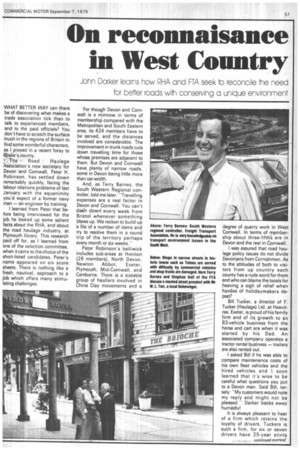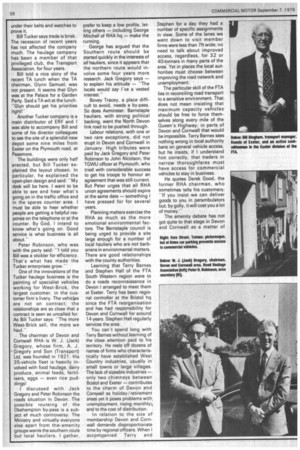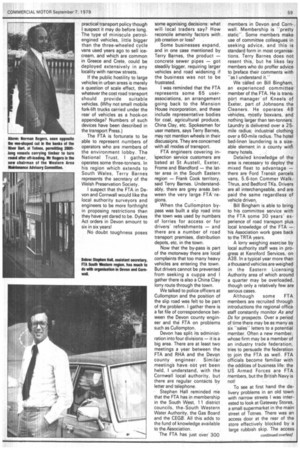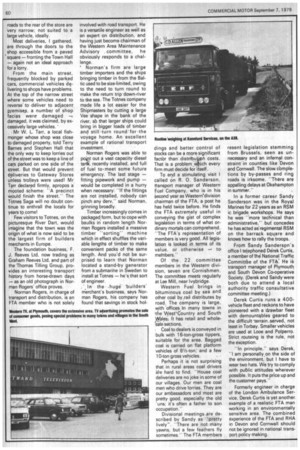On recoinuitaisance in West Country
Page 59

Page 60

Page 61

Page 62

If you've noticed an error in this article please click here to report it so we can fix it.
John Darker learns how RHA and HA seek to reconcile e need for belter roads with conserving a unique environment
WHAT BETTER WAY can there be of discovering what makes a trade association tick than to talk to experienced members, and to the paid officials? You don't have to scratch the surface much in the regions of Britain to find some wonderful characters, as I .proyed in a recent foray to ra k.e' s_.county. ..-,1-11.0".r,•• 'Road Haulage ASSoclation's new secretary for Devon and Cornwall, Peter H. Robinson, has settled down remarkably quickly, facing the labour relations problems of last January with the equanimity you'd expect of a former navy man — an engineer by training.
I learned from Peter that before being interviewed for the job he looked up some salient facts about the R HA, and about the road haulage industry, at Ply-mouth library. This research paid off for, as I learned from one of the selection committee, when it came to the choice of the short-listed candidates, Peter's name appeared on six score sheets. There is nothing like a fresh, nautical, approach to a job which offers many stimulating challenges. For though Devon and Cornwall is a minnow in terms of membership compared with the Metropolitan and South Eastern area, its 424 members have to be served, and the distances involved are considerable. The improvement in trunk roads cuts down travelling time for those whose. premises are adjacent to them. But Devon and Cornwall have plenty of narrow roads, some in Devon being little more than car-width.
And, as Terry Barnes, the South Western Regional controller, told me later: "Travelling expenses are a real factor in Devon and Cornwall. You can't 'dash down'. every week from Bristol whenever something blows up. We reckon to build up a file of a number of items and try to resolve them in a round trip of the territory perhaps every month or six weeks."
Peter Robinson's bailiwick includes sub-areas at Honiton (26 members), North Devon, Newton Abbot, Exeter, Plyrnouth, Mid-Cornwall, and Camborne. There is a sizeable group of hauliers involved in China Clay movements and a
degree of quarry work in West Cornwall. In terms of membership about three-fifths are in Devon and the rest in Cornwall.
I was assured that road haulage policy issues do not divide Devonians from Cornishmen. As to the attitudes of 'both to visitors from up country each county has a rude word for them and who can blame the locals for heaving a sigh of relief when hordes of holidaymakers depap?
Bill Tucker, a director of F: Tucker (Haulage) Ltd, at Heavitree, Exeter, is proud of his family firm and of its growth to an 83-vehicle business from the horse and cart era when it was started by his Dad. An associated company operates a tractor rental business — trailers are also rented out.
I asked Bill if he was able to compare maintenance costs of his own fleet vehicles and the hired vehicles and I soon learned that it's wise to be careful what questions you put to a Devon man. Said Bill, tersely: "My customers would note my reply and might not be pleased." Darker backs away hurriedly!
It is always pleasant to hear of a firm which retains the loyalty of drivers. Tuckers is such a firm, for six or seven drivers have 25-year stints under their belts and watches to prove it.
Bill Tucker says trade is brisk. The recession of recent years has not affected the company much. The haulage company has been a member of that privileged club, the Transport Association, for four years.
Bill told a nice story of the recent TA lunch when the TA chairman, Glynn Samuel, was not present. It seems that Glyn was at the Palace for a Garden Party. Said a TA wit at the lunch: "Glyn should get his priorities right!'" Another Tucker company is a main distributor of ERF and I was able to accompany Bill and some of his director colleagues to see the site of a splendid new depot some nine miles from Exeter on the Plymouth road, at Peasmore.
The buildings were only half erected, but Bill Tucker explained the layout chosen. In particular, he explained the open-plan design and said: "My desk will be here. I want to be able to see and hear what's going on in the traffic office and in the spares counter area. I must be able to hear whether people are getting a helpful response on the telephone or at the counter. By God, I intend to know what's going on. Good service is what business is all about.'' Peter Robinson, who was with the party said: "I told you Bill was a stickler for efficiency. That's what has made the Tucker enterprises grow."
One of the innovations of the Tucker haulage business is the painting of specialist vehicles working for West-Brick, the largest customer, in the customer firm's livery. The vehicLes are not on contract; the relationships are so close that a contract is seen as uncalled for. As Bill Tucker says: -.The more West-Brick sell, the more we haul.
. The chairman of Devon and Cornwall RHA • is W. J. (Jack) Gregory, whose firm, A. J. Gregory and Son (Transport) Ltd, was founded in 1921. His 35-vehicle fleet is heavily involved with food haulage, dairy produce,. animal feeds, fertilisers, eggs — even rice puddings!
I discussed with Jack Gregory and Peter Robinson the roads situation in .Devon. The possible routeing of . the Okehampton by-pass is a subject of much controversy. The Ministry and virtually, everyone else apart from theamenity groups wants the southern mine but local hauliers. I gather,
prefer to keep a low profile, letting others —.including George Mitchell of RHA hq — make the running. .
George has argued that the Southern route should be started quickly in the. interests of all hauliers, since it appears that the northern route would involve some four years more research. Jack Gregory says — to explain his attitude — -The locals would say I've a vested interest.
Bovey Tracey, a place difficult to avoid, needs a by-pass. So does Axminster. Barnstaple hauliers, with strong political backing, want the North Devon link. road to be pushed through.
Labour relations, with one or two rare exceptions, did not erupt in Devon and Cornwall in January. High tributes were paid by Jack Gregory and Peter Robinson to John Nicolson, the TGWU officer at Plymouth, who tried with considerable success to get his troops to honour an agreement that was still current. But Peter urges that all RHA union agreements should expire at the same date — something I have pressed for for several years.
Planning matters exercise the RHA as much as the more emotional environmental factors. The Barnstaple council is being urged to provide a site large enough for a number of local hauliers who are not barbarians in environmental matters. There are good relationships with the county authorities.
Learning that Terry Barnes and Stephen Hall of the FTA South Western region were to do a roads reconnaissance in Devon I arranged to meet them at Exeter. Terry has been regional controller at the Bristol hq since the FTA reorganisation. and has had responsibility for Devon and Cornwall for around 14 years. Stephen Hall regularly services the area.
You can't spend long with Terry Barnes without learning of the close attention paid to his territory. He reelsoff dozens of names Of firms who characteristically have established West Country industries, usually in small towns or large villages. The lack of sizeable industries — only two chimneys between Bristol and Exeter — contributes to the charm of Devon and Cornwall as holiday /retirement areas yet it poses problems with. unemployment, rising monthly,, and to the cost of distribution.
In relation to the size of membership Devon and .Cornwall demands disproportionate time by regional officers. When I accompanied Terry and .Stephen for a day they had a number of specific assignments in view. Some of the lanes we went down to visit member firms were less than 7ft wide; no need to talk about improved access, regardless, for 32 or 40-tonners in Many parts of the area: Yet in places the local authorities must choose between improving the road network and unemployment. • The particular skill of the FTA lies in reconciling road transport to a sensitive environment. That does not mean insisting that maximum capacity vehicles should be free to force themselves along every mile of the Queen's Highway; in parts of Devon and Cornwall that would be impossible. Terry Barnes sees nothing wrong in local authority bans on general vehicle access, but he insists, if I understand him correctly, that traders in narrow thoroughfares must have access for commercial vehicles to stay in business.
He quotes Derek Good, the former RHA chairman, who sometimes tells his customers: "If you insist we can deliver goods to you in perambulators but, by golly, it will cost you a lot of money."
The amenity debate has not got quite to that stage in Devon and Cornwall as a matter of practical transport policy though I suspect it may do before long. The type of miniscule petrolengined vehicles, little bigger than the three-wheeled cycle vans used years ago to sell icecream, and which are common in Greece and Crete, could be deployed extensively in any locality with narrow streets.
If the public .hostility to large vehicles in urban areas is merely a question of scale effect, then whatever the cost road transport should provide suitable vehicles. (Why not small mobile fork-lift trucks carried under the rear of vehicles as a hook-on appendage? Numbers of such devices have been described in the transport Press.)
The FTA is fortunate to be able to represent numbers of operators who are members of the environment lobby. The National Trust, I gather, operates some three-tonners. In his region which extends to South Wales, Terry Barnes represents the secretary of the Welsh Preservation Society.
I suspect that the FTA in Devon and Cornwall would like the local authority surveyors and engineers to be more forthright in proposing restrictions than they have yet dared to be. Dykes Act orders in Devon amount to six in six years!
No doubt toughness poses some agonising decisions: what will. local traders say? How reconcile amenity factors with job creation or loss?
Some businesses expand, and in one case mentioned by Terry Barnes, the product — concrete sewer pipes — got steadily bigger, requiring larger vehicles and road widening if the business was not to be frustrated.
I was reminded that the FTA represents some 65 userassociations, an arrangement going back to the Mansion House incorporation, and these include representative • bodies for coal, agricultural produce, China Clay, etc. Spokesmen for user matters, says Terry Barnes, may not mention wheels in their discussions. They are concerned with all modes of transport.
FTA engineers covering inSpection service customers are based at St Austell, Exeter, Frome and Blandford — the latter area in the South Eastern region — Frank Cook territory, said Terry Barnes. Understand.ably, there are grey areas .between the very large FTA• re gions.
When the Cullompton bypass was built a slip road into the town was used by numbers of lorries for access or for drivers' refreshments — and there are a number of road transport premises, distribution depots, etc, in the town.
Now that the by-pass is part of the motorway there are local complaints that too many heavy vehicles are entering the town. But drivers cannot be prevented from seeking a cuppa and I gather there is also a China Clay lorry route through the town.
We talked to police officers at Cullompton and the position of the slip road was felt to be part of the problem. I gather there is a fat file of correspondence between the Devon county engineer and the FTA on problems such as Cullompton.
Devon has split its administration into four divisions — it is a big area. There are at least two meetings a year between the FTA and RHA and the Devon county . engineer. Similar meetings have not yet been held, I understand, with the Cornwall local authority, but there are regular contacts by letter and telephone.
Stephen Hall reminded me that the FTA has i,n membership in the South West, 11 district councils, the,South Western Water Authority, the Gas Board and the CEG13. All this adds to the fund of knowledge available to the. Association.
The FTA has just over 300 members in Devon and Cornwall. Membership is "pretty static". Some members make use of committee colleagues in seeking advice, and this is standard form in most organisations. Terry Barnes does not resent this, but he likes lay members who do proffer advice to 'Preface their comments with "as I understand it."
We 'called on Bill Bingham, an experienced committee member of the. FTA. He is transport manager of Kneels of Exeter, part .of Johnsons the Cleaners. He operates 48 vehicles, mostly boxvans, and nothing larger than ten-tonners. Laundry is delivered over a 25mile radius; industrial clothing over a 60-mile radius. The hotel bed-linen laundering is a sizeable element, in a county with many hotels. . • Detailed knowledge of the area is .necessary to deploy' the mixed fleet to advantage — there are • Ford Transit parcels vans, 5.6-ton Commer Walk, Thrus, and Bedford TKs. Drivers are all interchangeable, and are paid the same regardless of vehicle driven,.
Bill Bingham is able to bring to his committee service with the FTA some 30 years' experience of road transport plus local knowledge of the FTA — his Association work goes back to the TRTA years.
A lorry weighing exercise by local authority staff was in progress at Kennford Services, on A38. In a typical year more than a thousand vehicles are weighed in the Eastern Licensing Authority area of which around a quarter may be overloaded, though only a relatively few are serious cases.
Although some FTA members are recruited through introductions the regional office staff constantly monitor As and Ds for prospects. Over a period of time there may be as many as six "sales" letters to a potential member. Often a new member, whose firm may be a member of an industry trade federation, tries to persuade the federation to join the FTA as well. FTA officials become familiar with the oddities of business life: the US Armed Forces are FTA Members, but the British Navy is not!
To see at first hand the delivery problems in an old town with narrow streets I was interested to look at Gateway Stores, a small supermarket in the main street of Totnes. There was an access door at the rear of the store effectively blocked by a large rubbish skip. The access roads to the rear of the store are Very narrow; not suited to a large vehicle, ideally.
Most deliveries, I gathered, are through the doors to the shop accessible from a paved square — fronting the Town Hall — again not an ideal approach for a lorry.
From the main street, frequently blocked by parked cars, commercial vehicles de livering to shops have problems. At the top of the narrow street where some vehicles need to reverse' to ddliver to adjacent p,remise, a number of shop facias were damaged damaged, it was claimed, by excessively large vehicles.
• Mr W. L. Tarr, a local fishmonger whose shop was close to damaged property, told Terry Barnes and Stephen Hall that the only way to keep lorries out of the street was to keep a line of cars Parked on one side of the street. But that would prevent deliveries to Gateway Stores unless trolleys were used! Mr Tarr declared firmly, apropos a mooted -scheme: "A precinct would finish the street." The Totnes Saga will no doubt continue to enthrall the locals for years to come!
Few visitors to Totnes, on the picturesque River Dart, would imagine that the town was the origin of what is now said to be the largest firm of builders merchants in Europe.
The foundation business, F. J. Reeves Ltd, now trading as Graham Reeves Ltd, and part of the 'Thomas Tilling Group, provides an interesting transport history from horse-drawn days — as an old photograph in Norman Rogers' office proves.
Norman Rogers, in charge of transport and distribution, is an FTA member who is not solely involved with road transport. He is a versatile engineer as well as an expert on distribution, and having just become chairman of the Western Area Maintenance Advisory . committee, he obviously responds to a challenge.
' Norman's firm are large timber importers and the ships bringing timber in from the Baltic used to be size-limited, owing to the need to turn round to make the return trip down-river to the sea.. The Totnes company made life a lot easier for the Shipmasters by cutting a large Vee shape in the bank of the river, sb that larger ships could bring in bigger loads of timber and still .turn round-for -the voyage home,. An excellent example of rational transport investment.
Norman Rogers was able to pojp.t out a vast capacity diesel tanli, recently installed, and full, of fuel to• meet some future emergency. The last stage — fitting pipework and pump — would be completed in a hurry when necessary: "If the fittings are not installed, nobody can pinch any derv,said Norman, grinning broadly.
Timber increasingly comes in packaged form, but to cope with baulks in random length Norman Rogers installed a massive timber "sorting" machine which in effect shuffles the variable lengths of timber to make convenient packs of the same length. And you'd not be surprised to learn that Norman located a stand-by generator from a submarine in Sweden to install at Totnes — he's. that sort of engineer.
in the -huge 'builders' merchant's business, says Norman Rogers, his company has found that savings in stock hol
dings and better control of stocks can be a more. significant factor than distribuOn costs. That is a problem'. 4ich every firm must decide fOritself.
To end a stimulating visit I called on R. 0. Sanderson, tYansport manager of Western. FUel Company, who is in his Second year as Westerridivision chairman of the FTA, a post he has held twice before. He finds the FTA extremely useful in conveying the gist of complex legislation in terms of what ordinary mortals can comprehend. "The FTA's representation 'of members is very good. All legislation is looked in terms of its
value, or otherwise to. members."
Of the . 22 committee members in the Western. division, Seven are Cornishmen. The commrttee meet's regularly at Lee Mill, near Ivy.bridge.
Western Fuel brings in bituminous coal by sea and other coal by rail distributes by road: The company is large, with offices, in many towns in Wesrtountry and South Wales: It -has retail and whole'Sale sections.
Coal to dealers is conveyed in bulk with 16-ton-gross tippers, suitable for the area. Bagged coal is carried on flat platform vehicles of 81/2-ton; and a few 10-ton gross vehicles.
Perhaps it is not surprising that in rural areas coal drivers aie hard to find. "House coal deliveries are no joke in some of our villages. Our men are coal men who drive lorries. They are our ambassadors and most are pretty good, especially the old 'uns; it's often a father to son occupation."
Divisional meetings are described by Sandy as "pretty lively-. "There are not many yawns, but a few feathers fly sometimes." The FTA members
resent legislation stemming from Brussels, seen as unnecessary and an infernal constraint in counties like Devon and Cornwall. The slow. cbmplebons by by-passes and ring roads is irksome. "There are appalling delays at Okehampton in summer."
In a former career Sandy Sanderson was in the Royal Marines for 22 years as an RSM ic brigade. workshops. He says he was "more technical than administrative," but concedes he has acted as'regimental RSM on the barrack square and knows how to rally the troops.
From Sandy Sanderspn's office I telephoned Derek Curtis, a member of the National Traffic Connmittbe of the FTA: He istransport manager of Plymouth and South Devon Co-operative Society. (Derek and Sandy were both due to attend a local authority traffic consultative committee meeting.)
Derek Curtis runs a 400vehicle fleet and reckons to have pioneered with a 'drawbar fleet with demountables geared to the difficult 'terrain ,served, not least in Torbay. Smaller vehicles are used at Looe and Polperro. Strict routeing is the rule, not the exception.
"In principle," says Derek, "I am personally on the side of the environment, but I have to wear two hats. We try to comply with public attitudes wherever possible. It puts the price up and the customer pays."
Formerly engineer in charge of the London Ambulance Service, Derek Curtis is yet another. example of a realistic FTA man working in an environmentally sensitive area. The combined experience of the FTA and RHA in Devon and Cornwall should not be ignored in national transport policy making.












































































































































